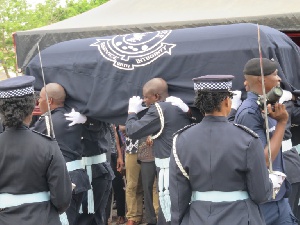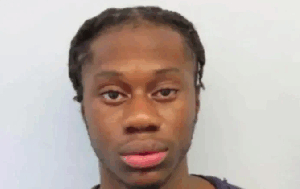The burial service was almost over. But before the police burial party took over, the family of the deceased was asked to step forward to be prayed for. As the grief-stricken son, daughter, wife and other members of the family walked towards the clergy, the police band was asked to play Horatio Spafford’s timeless hymn, “It Is Well with My Soul.” The police band, in my view, produces some of the best musical tunes one can hear anywhere on planet earth. They filled the late morning air with an impeccable rendition of the comforting hymn.
At that moment the sun suddenly lowered it’s scorching gaze, as if in reverence to the respectable police officer because of whom hundreds of people had gathered that Saturday morning at the Police Training School in Tesano, Accra.
When the sun dimmed, a gentle wind caressed the parade grounds and blew away the black flag covering the casket. A member of the burial party strode briskly to the centre of the gathering, to the lonely canopy that sheltered the casket and battled with the wind to put the cloth back in place. He succeeded in putting the flag back in its place, displaying the logo of the police service with its bold inscription: Ghana Police – Service with Integrity.
Seeing Ghana Police so close to the word “integrity” reminded me of the figure of speech called oxymoron. For those who may not remember much from their senior high school literature notes, oxymoron is a figure of speech in which contradictory terms or words are placed side by side, such as an honest liar. Indeed, the Ghana Police Service and integrity are very contradictory terms.
When the thought of the man whose mortal remains those words were covering crossed my mind, however, I felt the words might not be totally out of place at that moment. The police service may lack integrity but some men and women in the service could be credited with that rare quality in Ghana. The late Deputy Commissioner of Police, Angwubutoge Awuni, was one of the rare breeds of officers who uphold the vestige of integrity left in the police service. Such officers have ensured that there is some modicum of sanity in the institution, which has the unenviable record of always emerging as Ghana’s most corrupt institution in corruption perception indices over the years.
Corruption in the police service is not a perception. It is a reality. When you find them demanding their “road duty allowance” on the highways you will think they are enforcing their constitutional right. This week a family member whose cattle were stolen near Kintampo managed to find the alleged thieves and reported to the police. Before the police agreed to step out of the station, he paid them GHc900. They had charged him GHc1000 and he bargained.
Corruption and the willingness to subvert justice due to political and other pressures have soiled the reputation of the police beyond repairs, but there are still men and women who uphold the nobility of the service. And the police officer whose death on March 14, 2016, shook the nation was one of such people.
The police administration in a tribute said DCOP Awuni, “was an officer of exceptional bravery and courage who would not allow his work to be interfered with nor being cowed into submission once he felt he was on the right track in the performance of his duties.” In Ghana, tributes to the dead are more imaginary than fiction. Sometimes you wonder whether the beautiful words spoken at burial services are about the same grandson or granddaughter of the devil who is being laid to rest. For those who knew the late DCOP Awuni, however, the description by the police service was a true reflection of his no-nonsense disposition.
His first name, Angwubutoge (pronounced Agmibitoge) in Gurune/Frafra means speaking frankly despite the consequences. He spoke his mind and did what was right irrespective of who was in the firing range of justice, law and order. This earned him many friends as well as enemies. He was not the kind of police officers politicians liked, especially when they were in government.
In the run up the 2012 elections, the Greater Accra Regional Branch of the governing National Democratic Congress (NDC) was up against him. The party was livid that he ordered the arrest of former Regional Minister and MP for the Klottey-Korle Constituency, Nii Armah Ashietey. The man had interfered with the voters’ registration process at a centre near the MTTU Headquarters, where DCOP Awuni was. The arrest triggered calls for the removal of Awuni from the Greater Accra Region.
“He can be moved anywhere but not in Greater Accra,” NDC Regional Chairman, Mr Ade Coker, told Joy FM. “We in Greater Accra cannot work with a policeman like him [Awuni].”
In Ghana, transfers are ways of punishing people, especially when one is taken to very rural areas. But DCOP Awuni made it clear that he was not afraid of transfers.
“Where will they transfer you to? To Burkina Faso?” he once asked MTTU officers at the police headquarters while instructing them to deal with anyone who broke the law. “If they transfer you to any part of Ghana you will still be a police officer in Ghana. You won’t be a police officer in Burkina Faso.”
The Ghana Police Service is often seen as a puppet of the government. For this reason, no police officer wants to displease the government of the day. But that was not the style of DCOP Awuni. His last action that displeased the Flagstaff House was when organized labour went on a nationwide protest. In the Eastern Region, DCOP Awuni met leaders of the demonstrators and told them to comport themselves in order to have a peaceful march. He did not care to be politically correct even when journalists were recording him.
“I will urge you to impress upon your people to do what will not drag us into confrontation.” He told leaders of organized labour in the Eastern Region. “…I wouldn’t like our action to destroy the beauty of what you are doing…We are all workers. Let me be very frank with you, if it goes well it goes well for me, but I cannot go out there and demonstrate.” The Eastern Regional Police brass band also provided music for the demonstrators, an action which infuriated the seat of government.
This was the man the police service says was brave and courageous. After 57 years, his life on the planet ended. Fifty-seven years appears too short for such a good man, especially when his mother still is alive. But no one knows the agreement he had with his Maker. Besides, how long one lived does not matter. What matters is how well one lived. After a life of impact and dedication to duty, it was time for DCOP Awuni to go to where all of us would eventually go – the grave.
The impressive burial ceremony by the police would make one want to die if only such befitting farewell is assured. It sounds silly but true.
There was a police van towards the exit of the ceremonial grounds. The Police Band moved to the front of the van when the burial party was asked to take over. The burial party was made up of three contingents. The first contingent marched in two rows, stopped near the van and faced each other, leaving space between them. Then came the wreath bearers, a contingent of young and pretty female police officers, beautifully clad in their ceremonial uniforms. They marched and stopped close to the van, in the space created by the first contingent. The pallbearers then followed with the remains amidst the piercing sound of a trumpet. They passed between the wreath bearers and the first contingent and put the casket into the van.
The police band then took over. The Inspector General of Police, John Kudalor, led other senior police officers as they formed a long and beautiful file in a slow march out of the Police Training School. As they passed, the junior offices saluted. At exactly, 11:20 AM, the band was at the entrance of the school, playing “God be with You Till We Meet Again.”
Life on the busy roads outside the Police Training School had come to a standstill. Traffic from Achimota towards the Kwame Nkrumah Circle had been stopped. And so was traffic from Circle towards Achimota. Dispatch riders from the Motor Traffic and Transport Department had taken over the traffic light area, displaying their skills in honour of the man who served as the first director of the department before being transferred to the Eastern Region as commander. Passengers came out of their vehicles and watched as the convoy of police dispatch riders and vehicles with howling sirens sped off with the mortal remains of DCOP Awuni to the cemetery. It was an end of an era, the end of the man who had added so much weight to “Awuni,” one of the commonest names in the Upper East Region of Ghana.
The late DCOP Awuni left behind two children, Mrs. Akaaha Ngwibitoge, an employee of Tigo; and Nareyore Ngwibitoge, a young police constable with the Public Relations Unit of the Tema Regional Police Command.
Mr. Awuni Angwubotoge was enlisted into the Ghana Police Service on 15th July 1980 and passed out on 17th July 1981 as General Constable II. He had completed the Ghana Institute of Journalism (GIJ). His son also completed GIJ and just started where his father started in the police service. Apart from the challenge to work hard and rise just like his father did, Constable Nareyore is also expected to live his father’s legacy. But beyond this young man who is yet to overcome the loss of his father, DCOP Angwubutoge Awuni left an important message for the Ghana Police Service with the life he led in the service.
The message he left is this: Don’t let your environment define you. Don’t get soaked by the system. You can still stand out and stand up to be counted even if the system in which you find yourself is synonymous with rot. In Ghana if you are honest, brave and courageous in upholding the truth, you will be hated and despised. The system is designed to reward crooks and punish men and women of integrity. It is not only in the police service. It is everywhere in Ghana. But as Martin Luther King Jr once said, “the arch of the moral universe is long but it bends towards justice.” Good will always have the final and permanent victory over evil.
DCOP Awuni paid dearly for his principles. Those who are close to him know this too well. At a point he faced dismissal, which he fought with the help of his lawyers. But in the end, he died a hero. Those who brave the odds and do what is right will always be distinguished from the lot. We will be judged individually in the end. That is the message DCOP Awuni left. And the best way to remember him is to learn to live those values.
Opinions of Monday, 9 May 2016
Columnist: Manasseh Azure Awuni















